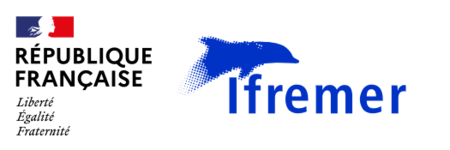Scientific and technical issues
In fisheries sciences, understanding the processes that govern the structuring of harvested populations is the determining factor behind their management. The development of methodologies also contributes to expanding the analysis of dynamics to other key compartments in the food web, such as zooplankton populations. The development of different aquaculture industries also depends on the acquisition of basic knowledge on the biology of species in their ecosystem.
Ifremer expertise and fisheries research
For public policy support, IFREMER focuses its scientific and technological activities on:
- stepping up the research effort on the identification of habitats, the determining factors behind the spatial distribution of populations, migration events and connectivity;
- understanding the processes that govern the spatio-temporal dynamics of populations to comprehend the mechanisms of response to global change by seeking to distinguish the effects of fishing from those of the climate;
- applying an experimental approach in controlled conditions and/or in situ to distinguish biological processes from confounding factors;
- including a study of the ecosystem impact of persistent contaminants on population dynamics and food webs and working to elucidate the multi-scale processes of pollutant fate, the effects of exposure and ultimately assess the impact of contaminants on fish populations;
- enhancing understanding of the interactions between fishing activities and resources/habitats (this approach should improve the selectivity of fishing gear by decreasing discards and minimising the impacts of bottom trawling and dredging);
- accompanying the surge in numerical modelling in fisheries sensu largo (formulation of scenarios).
Organisation of fisheries work at IFREMER
IFREMER has five fisheries research units on the French mainland with a geographic distribution relevant to their respective sector programmes:
- HMMN (Boulogne-sur-mer and Port-en-Bessin) for the eastern English Channel-North Sea sector,
- STH (Brest and Lorient) for the western English Channel, the Bay of Brest and the northern part of the Bay of Biscay sector,
- Marbec (Sète) for the Mediterranean Sea sector,
- EMH (Nantes) for the Atlantic Ocean sector,
- HGS (L’Houmeau and Anglet) for the southern part of the Bay of Biscay, more particularly in the Straits of Charente, the Bay of Arcachon and the Capbreton submarine canyon sector.
Overseas, fisheries sciences are undertaken at the Biodivhal unit (French Guiana), the Biodivenv unit (Martinique, for the French Antilles) and the DOI unit (Réunion Island) as well as the SPM unit (Saint-Pierre et Miquelon).
IFREMER’s Fisheries Information System (Système d’Information Halieutique -- SIH) general mission is to manage the observation activities required for fisheries expertise and associated research carried out by IFREMER. The Institute, the main partner of the French Directorate for Marine Fishing and Aquaculture (DPMA) for the multi-annual programme for fisheries data collection (DC-MAP), takes on different roles according to the needs of the programme (monitoring the yield of fishing boats, scientific cruises, surveys on fishing activity and the fish market): project engineering, implementation of specific tasks and other operations.





